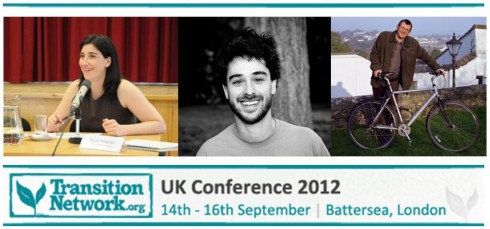10 Sep 2012
Transition Network conference 2012 preview: No:15 – “Should we be reshaping Transition for times of austerity?”
One of the workshops in the Saturday morning workshops session is called ‘Should we be reshaping Transition for times of austerity?’, and will feature Filipa Pimental, International Coordinator of the Transition National Hubs, Juan del Rio from the Spanish National Hub, and will be chaired by Transition Network’s Rob Hopkins. The workshop will aim to explore how Transition is emerging differently in places where the economic crisis is impacting severely, and in places where its impacts are yet to be strongly felt. In the former, Transition is emerging more along the Gift Economy kind of model, in the latter the REconomy approach is felt to be most suitable. How do those two sit alongside each other, and what does this mean for the role of Transition Network? Expect discussion, debate and dialogue. The three presenters recently joined by Skype to discuss their plans for the workshop:

Ale Fernandez
11 Sep 3:00pm
Hi,
Just to say a bit about how I feel about all that, after living in Spain and England and being in transition initiatives since 2007ish, I’ve seen it grow and I’ve seen the cultural difference and how something like decreiximent is much more popular. Meanwhile also, the recession has made it normal to pass all sorts of people looking through rubbish. I’m not immune to the crisis, so now I’m transitioning more into barter networks and social currency from necessity as well as from wanting to show it all to people. Using it as an everyday thing, and depending on it makes you have a very different attitude to exchange, a fascinating experience in itself, when you start to place your own value on things or people doing things around you. Once again community helps: in my block of flats for example we all eat together and have lots of shared spaces which we plan to sort out as work spaces also, and this week we are making our first shared food orders, but we’re a bit special I think 🙂
In my flat I’ve been using the SODIS water treatment method to save a few euros, I’m really interested in developing the eliodomestico too )http://inhabitat.com/eliodomestico-solar-terracotta-water-filter-distills-5-liters-of-water-a-day/)as we are by the sea, and we’re doing a rocket stove workshop and shared meal on wednesday with barcelona en transicio.. Most of the focus as always is on the surroundings rather than the inner city though, and in Catalunya we have some very productive coops and small producers and a network along the southern coast of “Ecoxarxes” a food coop network.
So I’m not talking about transition in general, but from a more personal point of view I guess it includes some element of the “professionalisation” that some transition project members went through in the UK. Ideas become projects that actually keep us afloat in some way or other, and a hope for the future keeps you meeting people and creating some kind of support network. But it’s also transition to an informal, reciprocal economy and way of life even, as cooperatives, democratic organising, relocalisation and barter ideas continue to inspire people to be creative, and to question the mistakes that led to the crisis in the first place.
Ale